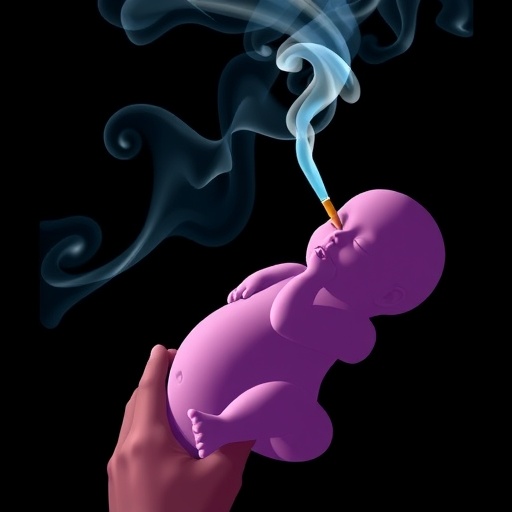A groundbreaking epidemiological study emerging from the American Academy of Pediatrics’ 2025 National Conference reveals a compelling correlation between declining maternal smoking rates and a simultaneous decrease in the incidence of gastroschisis among newborns. This birth defect, characterized by the infant’s abdominal organs protruding through an underdeveloped abdominal wall, has long perplexed clinicians and researchers alike due to its complex etiology involving environmental and genetic factors. The U.S.-based research, leveraging an extensive dataset covering over 25 million live births from 2017 to 2023, directly associates the drop in maternal cigarette consumption prior to conception with a measurable reduction in gastroschisis cases, signaling a significant victory for public health interventions centered on smoking cessation.
Gastroschisis poses severe clinical challenges, typically requiring immediate surgical intervention after birth. The condition’s pathogenesis is believed to stem from aberrant embryonic vascularization and abdominal wall formation in utero, intricately linked with maternal exposures and behaviors. Previous studies have identified smoking as a potent teratogen, capable of disrupting fetal development via hypoxia and inflammatory pathways. However, this latest investigation elucidates not only the risk imposed by maternal smoking but also quantifies the impact of the volume of cigarette consumption on gastroschisis risk, providing critical insights into dose-dependent embryopathology.
The researchers harnessed a comprehensive, de-identified national database managed by the U.S. Department of Health and Human Services, pinpointing both the presence of gastroschisis diagnoses and maternal smoking habits within a crucial preconception window. Analysis demonstrated a striking linear decline in maternal smoking prevalence from 9.4% in 2017 down to 4.1% in 2023. Concurrently, the incidence of gastroschisis fell from 2.4 to 1.6 cases per 10,000 live births, revealing an unprecedented temporal link between these public health metrics that had eluded prior scrutiny at this scale.
This correlation transcended mere association; dose-response modeling indicated that for each incremental increase of 10 daily cigarettes smoked by expectant mothers prior to conception, the odds of their child being born with gastroschisis rose by 39%. Such statistical precision underscores the biological plausibility that tobacco exposure exerts a graded deleterious effect on embryonic development, advancing beyond binary risk categories and enabling refined risk stratification for clinical counseling and public health policy.
The implications of these results resonate beyond statistical models, highlighting the tangible benefits of anti-smoking campaigns, particularly those targeting women of reproductive age. By substantially reducing smoking prevalence before pregnancy, public health initiatives have inadvertently decreased the burden of a rare but debilitating congenital anomaly, validating investments in behavioral interventions as a form of congenital disease prevention on a population scale. Pediatric surgeons and neonatologists, who routinely manage gastroschisis cases, stand to benefit from the downstream effects of lowered incidence, which could translate into reduced healthcare costs and improved neonatal outcomes.
Notably, this study’s strength lies not only in its vast dataset but also in its temporal granularity, capturing smoking trends and birth defect incidence within the same national timeframe. Such synchrony permits more robust causal inferences, a challenge that has historically complicated congenital epidemiology where cross-sectional snapshots are the norm. These findings reinforce the paradigm that modifiable maternal behaviors prior to conception exert profound impacts on fetal health, a crucial consideration for preconception care frameworks.
While the scientific community has long recognized smoking as an adverse maternal behavior, this research quantifies its precise influence on gastroschisis risk, emphasizing the necessity for early intervention—well before pregnancy confirmation—when habits may already be deeply entrenched. The clear dose-dependent relationship challenges clinicians to adopt nuanced messaging strategies, encouraging not only cessation but also reduction, recognizing that even incremental improvements confer measurable fetal health benefits.
Future research avenues will likely delve into the underlying molecular mechanisms through which maternal smoking orchestrates abdominal wall malformations, potentially implicating oxidative stress pathways, chromosomal aberrations, or epigenetic modifications during critical periods of embryogenesis. Such mechanistic insights could unlock novel prophylactic or therapeutic targets, enhancing prenatal care beyond behavioral risk mitigation.
The study’s lead investigator, Dr. Zane Hellmann, underscored the public health significance of these epidemiologic links, noting that interventions relatively simple in scope—like reducing smoking—can yield profound, albeit sometimes underappreciated, dividends by mitigating congenital abnormalities. The ripple effects of these findings advocate for sustained funding and innovation in public health strategies, amplifying their role in primary prevention.
In an era where rare congenital conditions often require expensive, multidisciplinary intervention, reducing incidence through modifiable maternal exposures offers a beacon of hope for alleviating healthcare burdens and improving child health outcomes nationally. The research community eagerly anticipates publication of the full study in a peer-reviewed journal to scrutinize methodologies further and explore potential confounding variables.
The American Academy of Pediatrics presentation, scheduled during the 2025 National Conference & Exhibition in Denver, offers a platform for wider dissemination and discourse, inviting questions from clinicians, researchers, and policymakers invested in maternal-fetal health. The transparency of data and proactive engagement with media and stakeholders exemplify rigorous scientific communication, critical for translating findings into practice.
In sum, this extensive epidemiological evaluation reinforces a vital public health message: efforts to curb maternal smoking are not merely beneficial for adult health but serve as a cornerstone for reducing rare but impactful congenital defects such as gastroschisis. This dual benefit enshrines smoking cessation as a foundational element of reproductive health strategies, ushering a new era of preventive pediatrics grounded in robust population-level data.
Subject of Research:
People
Article Title:
Smoking Decline Leads to Fewer Newborns with Gastroschisis, Research Finds
News Publication Date:
26-Sep-2025
Keywords:
Pregnancy, Pregnancy complications, Health and medicine, Diseases and disorders




